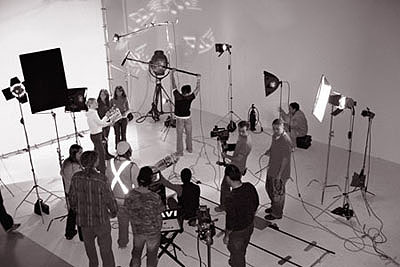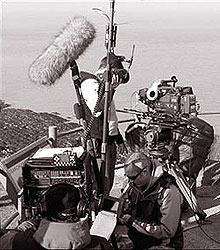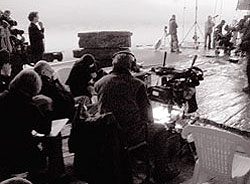- No products in the cart.
28
Nov
Set Etiquette and the Chain of Command – Part 2
by Rick Patton
/ 6 Comments

If the Production Sound Mixer has this problem, it’s basically the same game but the stakes are higher. When crewmembers refuse to stop working during a take the mixer might send the boom op to quietly ask the 1st AD to straighten them out. The 1st AD is in charge of the set and the crew. A stern word from the 1st AD might be enough to quiet things down. Some sets are more disciplined than others regarding quiet on set. This discipline is usually enforced by the 1st AD. ADs may present themselves as having ultimate control over the set but they do not sign your paycheck. Your ultimate responsibility is not to make ADs happy. It might happen that the 1st AD doesn’t care much about your problem and does nothing to help. At this point, your understanding of hierarchies and group power dynamics comes into play. It also helps if you have mentally prepared yourself for a conflict of this sort. You need to pick your battles. If this situation comes down to 2 pages of useable dialogue versus losing the scene to unnecessary set noise, you are justified in pushing harder to get the track. That is, after all, what they’re paying you for. Without the cooperation of the ADs you’ll likely need the support of someone further up the food chain, e.g., the director, a producer, or someone else with enough juice to effectively back you up. At some point, the image of standing in front of an oncoming train will come to mind. Remember, you are not on set to make friends and be loved, important as those may be. If you are unwilling to fight for your tracks, it’s unlikely anyone else will. No one respects a doormat.

Let’s break this into 2 stages: Day 1 and Day 5. If the set is out of control on Day One, you might mention that to anyone who shows an interest. Make clear requests to the ADs or the Director to get a grip. Give them some time to sort things out, but stay with it. If the situation doesn’t improve by Day 5 and you are losing tracks for no good reason, call post-production and check if they are hearing problems with the tracks. If they agree, then you can work together and approach a producer. The end product is supposed to be good tracks and ADR only when it’s unavoidable. Producers, especially those with budget responsibilities, will understand that good location tracks are money in the bank. They can see that you are working in their best interest. The 1st AD might be a bit out-of-joint when he hears your message from his boss but it’s rare that a 1st AD will ignore that message. You might find that AD is a bit cold towards you for a while but that chill will be tinged with respect. In the end, if the sound is good it makes the AD look good. This is a part of set etiquette they don’t teach in film school.
What’s the proper etiquette for getting screwed? What do you do when you’re shooting a page of dialogue in the 11th hour, losing the light, and there’s a mile long freight train going by (out of frame)? You just suck it up and mark it as Guide Track. You can’t win that battle but you should be gracious when you lose. Don’t whine and don’t complain. Don’t feel compelled to blame anyone. Most movies contain many shots where the sound was replaced for one reason or another.

Sound technicians can easily develop a reputation as whiners. The location is noisy, the camera is never quiet enough, the extras are scuffing their feet, that shirt is too noisy, blah, blah, blah. Whining is bad etiquette. Whining, after all, is complaining about something you won’t or can’t fix. It accomplishes very little. Better to come up with a solution and take some action to execute it. If it doesn’t work out, move on. Whining is not attractive and does not build respect for your department.
©Richard Patton 2008
Excerpt from “Sound Man” by Rick Patton C 2009, reprinted with permission.
With over 30 years experience, Richard Patton is one of Vancouver’s most experienced and respected feature film sound mixers. Since 2007 Rick has been Branch Manager at Trew Audio Vancouver.
6 comments
Leave a reply Delete Message
You must be logged in to post a comment.


 US
US  Canada
Canada 
Very well stated Richard. Working as a boom op and mixer, I have done a few of the "buy some time tricks" myself, and they work, but don't do them too much is right. And yes, we will be called whiners, it we must suck it up and tell ourselves, "at least we're doing our job," and that's the truth. Thank you for the article.
I mix and fill the gaps with epk and the like. I've no problem with the whiner label as long as the mix is in the bag and post and production knows it.
Generally, everyone's tunnel vision for the picture and that's fine until we're off of cloud 9 and folks are whining about bad sound. I'm a fan of as much control I can get on the set but yes, I certainly pick my battles. You can be right as rain but if you come off as too much over the top, it seems at that point that's all folks will see (over the top) and that's how and what they'll respond to, balance seems an appropriate step.
I couldn't say it any better about who has your back when there's a problem, hence, it seems ok to push for it when it counts.
Regards
Richard, I think you did a great job with this article! A lot less "crust" and a ton more "meat" in this edition. I know I took a lot of flack from my comments to your first "etiquette" article, but I stand by most of those words. This version has a much, much bigger take away. And that's what I think you intended for all of us. After talking to you via email I am glad I gave this a second chance. Not that I never run into a difficult day doing sound, maybe it's the people I work with generally, but I usually don't have to pull the cool tricks yu outlined. Though if the need arises, I'll surely remember these! Thanks.
Chas Gordon
Thanks for part 2 of this very insightful reading! As a sound editor, I'm always curious about the set life and the previous history of the material I get. But I'm not sure about your comment on the ADR that "good location tracks are money in the bank". At least here (Germany), 1-2 days ADR is included in every actors contract and recording prices are so much beaten down, that it doesn't seem to make a difference how much ADR the production needs to do. Don't get me wrong, I love great production sound! I'm just not sure if the money argument still works...
Regards
A few notes:
I've found that I can always get away with asking for "just 30 seconds" to fix something (or run an additional cable for a plant mic, or whatever) and then take a few minutes to do it, no one has ever timed my "30 seconds". However, if I ask for a minute, I'm usually told "we don't have the time for that".
Secondly, I've never had a problem in about 30 years of doing this with asking or signaling the AD that I need a cut when there's a background noise issue, if I go to the boom op and pull the cable off the mic, shake it, blow in the xlr, shake it again, and then plug the mic back in. I go back to the mixer, put on my headphones and make some twiddle around motions that do nothing, and then tell the AD that "we're o.k. now".
You just can't do this sort of stuff too often, but it will usually buy you some time.
Cheers,
Jerry
I agree with everything that Rick has written and after 40 years on sound I have found what he says to be true.
One thing I try to do in Australia is to "enlist" other departments into our problems.In other words realize that other departments have Similarly important issues as well and treat them respectfully.
I always try to suggest an alternative plan for some thing that is conflicting with the sound process. People will begin to see it as a co operative venture not a contest if you approach it from this angle. Show your appreciation when some one does some thing helpful for you and tell them that they have helped make good sound possible.
If the Generator is a little too loud but you know that it can be notched out in production - don't make an issue of it - save your bullets. Go to the Gaffer and tell him the situation but that you can fix it this time but could he and you please check the position early next time so that it is not a major move during a busy lighting set up. Earn his respect. One mixer I know would always ask them "How much cable have you got?" This earned undying animosity from the electrics dept.
Remember co-operation is a state of mind. We have to know about all other departments in order to solve their and our problems so make friends with them and involve them in your work in a friendly way then the whine factor will be reduced making your life easier.
In the case of egocentric Directors you can only advise. If the Doctor tells you to give up smoking and you don't - you die - not him. Advise the director tactfully that there are some great performances being lost by his prattle during a take - but it's his picture after all. Just clarify it with the producer that this is happening against your advice then cool it. You will almost always have to fight the production to make their sound useable for them!
Fight the good fight.